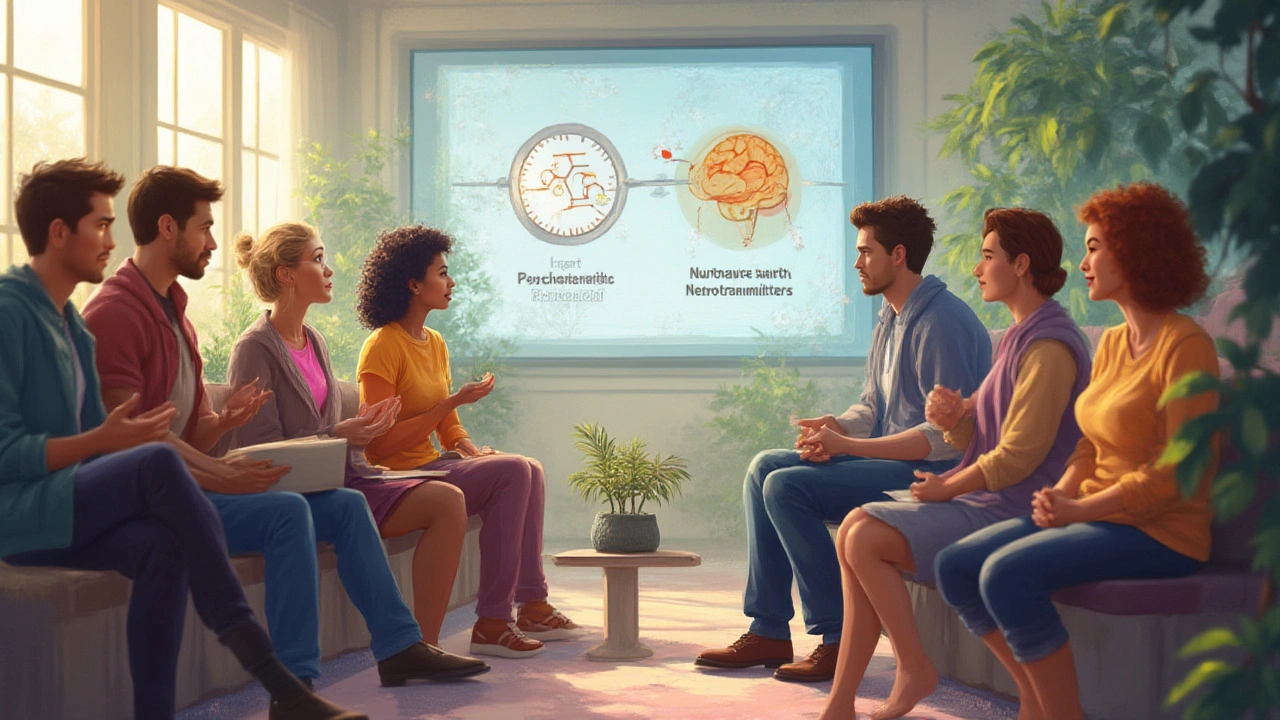If you even whisper “psychotropic drugs” in a café in Auckland, half the room gets tense. Rumours swirl about personality changes, dependency, and people feeling like zombies. But do these horror stories really stack up against reality? Let’s pull back the curtain on psychotropic medication, ditching the fear, and spotlighting the facts. Some things might surprise you, and others could even ease your worry if you or someone you know is considering—or already using—these medications. It’s time to get honest, practical, and cut through those urban legends for good.
Understanding Psychotropic Drugs: What Are They Really?
When people say someone is “on meds,” they’re usually talking about psychotropic drugs. This term covers a group of medications that target our thoughts, mood, or behaviour. Sounds like magic, right? Not quite. It’s actually pure science. The most common categories include antidepressants, antipsychotics, mood stabilizers, anxiolytics (like anti-anxiety meds), and stimulants. Each of these comes with its own purpose, risks, and effects. For example, selective serotonin reuptake inhibitors (SSRIs) like sertraline or fluoxetine are prescribed all over the globe for depression and anxiety. Antipsychotics like risperidone or quetiapine help stabilize thought in bipolar or schizophrenia—bringing relief to folks who’ve struggled for years.
But here’s the truth: these drugs don’t magically “fix” the brain. Instead, they help regulate neurochemicals like serotonin, dopamine, and norepinephrine. Imbalances in these chemicals are linked to symptoms like chronic sadness, racing thoughts, or wild mood swings. The brain is a delicate balance, and psychotropic drugs aim to restore some calm. Think of it a bit like diabetes or asthma—your brain just needs extra support.
A big myth? That all these drugs are just sedatives that flatten people. Not so. Many antidepressants actually energize people, especially when they’ve lost the drive to get out of bed. Stimulants (like those for ADHD) can improve focus and functioning. These meds are carefully customized. Psychiatrists usually start slow, adjust doses over weeks, and check for side effects. It’s not the “one pill fixes all” situation that gets tossed around online.
Here’s an interesting tidbit: in New Zealand, one in six adults has filled at least one prescription for a mental health medication in the past year. That’s a lot of people quietly battling mental health issues—and also a sign that if you’re considering meds, you’re definitely not alone.
You might hear chatter about pills changing your personality. But the right medication should make you feel more like yourself, not less. Most side effects are temporary, and major changes (like feeling unnaturally flat or wired all the time) are a sign to talk with your doctor about adjustments.
Walk into any pharmacy in Auckland, and you’ll see shelves with everything from old-school tricyclic antidepressants to newer atypical antipsychotics. The word “psychotropic” just means “acting on the mind” and that could mean calming a storm of anxiety or helping someone see past paranoid thoughts. Even so, every med comes with risks. For instance, some antipsychotics may cause weight gain or increased risk of diabetes if monitored poorly. SSRIs might unsettle your stomach or impact sleep. But with healthcare oversight, regular follow-ups, and healthy communication, serious problems are rare.
It’s worth knowing the difference between dependence and appropriate, long-term use. While benzodiazepines (like diazepam or lorazepam) can be addictive if used daily over months, most antidepressants aren’t habit-forming in the traditional sense. If you do need to stop, it’s important to taper off with your doctor, never go cold turkey.
| Type | Common Uses | Notable Side Effects |
|---|---|---|
| SSRIs | Depression, anxiety | Nausea, sleep changes, headaches |
| Antipsychotics | Schizophrenia, bipolar | Weight gain, sedation |
| Mood stabilizers | Bipolar disorder | Tremor, increased thirst |
| Stimulants | ADHD | Insomnia, decreased appetite |
This table shows just a glimpse—the real-world experience will hinge on your body, your diagnosis, and your healthcare team’s expertise.

Debunking Common Myths and Fears Around Psychotropic Medication
There are more wild stories about psychotropic medication than there are types of cheese in a New Zealand supermarket. One of the top fears? “I’ll get addicted.” In reality, the vast majority of these medications are not addictive in the ways that substances like tobacco or alcohol are. Yes, some anti-anxiety drugs (mainly benzodiazepines) can cause dependence if taken daily for weeks or months, but psychiatrists are super cautious about this and usually prescribe them for short bursts or specific events, not ongoing use.
Then there’s the “personality change” myth—as if taking a tiny incognito pill will turn you from a bubbly chatterbox into a zombie. In truth, most people report they return to their baseline personality once their symptoms are under control. If you suddenly feel nothing at all (no sadness, excitement, or motivation), that’s a signal your dose, or even the med itself, isn’t quite right. The real goal is to help you function, not erase who you are. In session after session, psychiatrists actually ask about these subtle shifts—it’s one of their main checkpoints.
Worried about losing your edge or creativity? That fear pops up a lot, especially among artists and students. There’s zero evidence that the right antidepressant kills creativity. In fact, untreated depression tends to block concentration and dull creativity far more than any well-managed medication. Some of the world’s most famous writers, musicians, and entrepreneurs have shared their positive experiences with psychiatric meds.
Here’s a curveball: some people actually fear that taking medication means their mental illness is “severe” or “incurable.” This is outdated. Meds are tools, not last resorts. Doctors recommend them for everything from short-term anxiety (think public speaking) to major ongoing depression because evidence shows they work. Sometimes, a short course of meds can kickstart healing—an NZ-based study in 2023 found that 68% of young adults taking SSRIs for the first time noticed improvements within 8 weeks when also seeing a counsellor or psychologist.
Let’s touch on the elephant in the room: side effects. Every pill—even everyday painkillers—can cause some unwanted effect. The vast majority of medication side effects are mild and temporary. Yes, about 23% of people starting a new antidepressant notice tummy troubles or dizziness in week one, but only a fraction stop taking them for this reason. Simple fixes like taking medication with food or at night can dramatically lessen these issues. And remember the trade-off: untreated depression and anxiety have real risks for work, relationships, and even physical health.
Misconceptions around “forever pills” pop up regularly. People get nervous they’ll have to stay on meds for life. But lots of folks stay on medication only until their symptoms stabilize. For depression, the recommendation is usually to continue for six months after you feel better, then slowly taper with medical help. For conditions like bipolar disorder or schizophrenia, longer-term meds keep things stable—no shame in that, just as someone with asthma or high blood pressure might take a daily med.
Don’t underestimate the placebo effect, either. Sometimes, just knowing you’re receiving regular help (whether medication or therapy) starts to shift how you feel. But that doesn’t mean the meds don’t work—the same way a cast helps a broken leg heal, a med can help a struggling brain “reset.”
| Fear or Myth | Reality |
|---|---|
| All meds are addictive | Most are not. Only some, like certain anti-anxiety pills, can cause dependence. |
| Personality will change | Meds help restore your natural state, not alter it. |
| You’ll be on them for life | Often, meds are used short-term. Long-term if needed for chronic conditions. |
| Meds erase creativity | No solid evidence. Untreated symptoms impact creativity more. |
Key tip: always report new or worrying side effects to your doctor. Don’t just stop on your own—sudden quitting can sometimes be dangerous or uncomfortable. If you’re ever feeling unwell, your medical team can swap meds, lower doses, or add another strategy.
Another little-known fact: if you need to travel or move, New Zealand pharmacies can often source your regular medication if it’s registered under a different name globally—just ask for help bridging the gap. This flexibility is a lifesaver for frequent travellers or expats.

How to Use Psychotropic Medication Safely and Make Informed Choices
Whether you’re nervous or just curious, making medication decisions should always be a two-way street with your doctor. Start by listing every symptom, question, or fear you have. Don’t sugarcoat anything! The more open your conversation, the better the fit you’ll get. If your doc recommends a psychotropic drug, ask why that one, what the expected benefits are, and what side effects to watch for. Find out how long it takes to feel better—most antidepressants, for example, don’t show much effect for the first two weeks, and full benefits can take up to six or even twelve weeks. Good to know, so you don’t give up too soon!
Set up regular follow-ups. These check-ins (often by phone) make it easy to tweak your dose or switch meds as needed. Many pharmacies in Auckland (and across New Zealand) offer medicine management programs, reminding you when to refill and helping you stay on track. Some practitioners also work with pharmacists, so you get an extra layer of support in monitoring for side effects.
If you’re worried about cost, check what’s funded by Pharmac (the government agency that subsidizes medicines here). Most first-line antidepressants and antipsychotics are subsidized for NZ residents, making them way more affordable than people assume. Generic versions are just as effective, and your doctor will always try to balance cost, benefit, and availability.
Let’s get practical. The best way to lower risks and maximize benefits is pretty simple:
- Take meds at the same time every day—set a phone alarm or put the pack by your toothbrush if you need a reminder.
- Know all the names of your meds (brand and generic), in case you ever need to talk to a new doctor or travel.
- Log any side effects and mood changes in a notebook or app—this helps doctors tailor your treatment.
- Don’t mix psychiatric meds with alcohol or recreational drugs unless cleared with your healthcare team. It can mess with how meds work.
- If you miss a dose, don’t double up. Take your next dose at the usual time unless your doctor says otherwise.
- Share your full medical history, including any herbal or over-the-counter products you take. Even a multivitamin or St John’s Wort can interact with some psych meds.
Use community resources. In Auckland, local organizations like the Mental Health Foundation and the Like Minds, Like Mine campaign offer workshops and real-life stories on living well with medication.
For people new to psychotropic drugs, it’s normal to feel hesitant. Friends or family might chime in with their own (well-meaning, but not always accurate) opinions. Remember, you’re the expert on your own mind, and what works for one person might not work for another. If you try a medication and it’s not a fit, that’s not a failure—it’s just part of the process.
If you’re struggling with stubborn symptoms, combo therapy often helps. Mixing meds isn’t unusual for complex conditions, but this always needs to be managed by your doctor to avoid harmful interactions. Similarly, therapy (like CBT or talk therapy) boosts medication’s effect. In fact, a 2024 study at the University of Otago found that patients treated with both meds and weekly therapy reported 35% higher rates of long-term recovery compared to meds alone.
One more nugget: some people worry about long-term effects on memory or brain health. So far, long-term studies find that when used and monitored properly, most psychotropic meds don’t cause memory loss. If anything, untreated severe depression has a far stronger link to lasting cognitive issues. So that fear? Not really backed up by science.
Trying to predict exactly how you’ll respond to a new med is a bit like guessing the weather—doctors use their experience and the latest guidelines, but your feedback is crucial in fine-tuning things. Be open, keep those appointments, and stay curious. There’s no gold star for toughing it out unmedicated if you’re truly struggling—sometimes modern medicine is the fastest track back to living your real, full life. If you ever feel brushed off, or just not listened to, get a second opinion. This is your health, your story—so make sure it’s told right.
Despite the old-school stigma, psychotropic drugs are just one of many modern tools that help people with mental health issues find stability, balance, and even joy. You’re not alone, you’re not broken, and you’re not stuck. Stepping out of fear and into knowledge can make all the difference. So if you’re weighing the risks, remember: you have more options, more control, and more hope than the old myths would ever let you believe.

